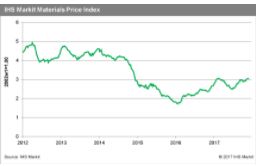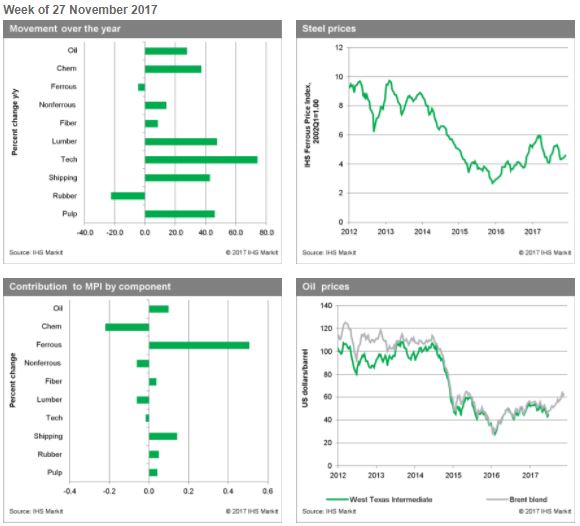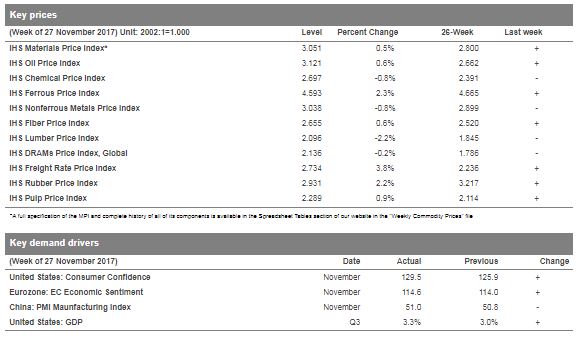| Week ending December 8, 2017 |
Steel markets drive the rise
|
The IHS Markit Materials Price Index (MPI) increased by 0.5% last week, its fourth consecutive gain. The increase was more broadly based than in recent weeks, with six of the ten subcomponents rising. Freight and ferrous metals were the biggest movers, increasing by 3.8% and 2.3%, respectively.
Steel markets appear to have been the driver behind last week's increase in the MPI. Chinese cuts in both steel production and iron ore mining have boosted industry margins worldwide. The hope is that this spring will see a rebound in steel making that will boost seaborne iron ore shipments because of continuing restrictions on Chinese mines.
Macroeconomic data last week contributed to the positive mood in markets. Global manufacturing continued to expand at a healthy clip with November's headline IHS Markit Manufacturing Purchasing Manager's Index (PMI) recording its best reading since March 2011. The only disappointment in the data was from China, where the Caixin Manufacturing PMI fell to 50.8 in November. Slower growth in China is one of three reasons we see commodity prices remaining relatively range bound next year. Markets also received a boost at week's end because of the growing likelihood of a US tax cut by year-end and therefore the prospect of fiscal stimulus in 2018. Next up for markets will be the US Federal Reserve meeting on 12–13 December. It is widely expected that interest rates will be lifted another 25 basis points. It will be interesting to see how markets and the US dollar react—tighter financial conditions are the second reason we see a change ahead in commodity markets. The third reason we see commodity prices relatively flat in 2018 is the price of oil, which we believe will retreat slightly in early 2018 despite continued discipline on the part of OPEC.
|
|
|
| | IHS Materials Price Index |  |
|
| | 
| Market Insight
For an overview of the IHS Materials Price Index, view this video.
Get the Materials Price Index delivered to your in-box weekly.
Subscribe here.
|
|  |
| | |
|
| Industrial Materials: Prices |  |
| Key Prices & Demand Drivers |  |
Construction Labor Costs Reach Highest Level in Almost Three Years, IHS Markit Says
|
Construction costs rose again in November, according to IHS Markit and the Procurement Executives Group (PEG). |
The current headline IHS Markit PEG Engineering and Construction Cost Index registered 60.2, supported by strong figures in both the materials/equipment and labor sub-indexes. The materials/equipment price index was 60.9 in November, moving up from the October figure of 58.9. Price increases were widespread. Current subcontractor labor prices rose at a fast pace in November: the index figure came in at 58.5, the highest reading since December 2014. “Subcontractor rates continued to accelerate over November and expectations for future increases reached a five-year high,” said Emily Crowley, principal economist - pricing and purchasing, IHS Markit. “Tightening labor market conditions combined with an uptick in activity are driving expectations of future rate increases. Currently the U.S. South and West are having the most trouble finding workers leading to stronger wage escalation, whereas the end of major projects in Eastern Canada are keeping pressure off of wages in that region.”
| | Learn More |
|
| About IHS Pricing & Purchasing | | The IHS Pricing & Purchasing Service | The IHS Pricing & Purchasing Service enables supply chain cost savings by providing timely, accurate price forecasts and cost analysis. Armed with a better understanding of suppliers' cost structures and market dynamics, organizations can effectively negotiate prices, strategically time buys, and boost the bottom line.
With a database of more than 80,000 historic prices and thousands of price, wage and input cost forecasts, IHS offers more coverage than any other provider in the market. IHS has been providing forecasts of key commodity, labor, and input costs since 1970 -- helping define the purchasing advice industry. | | Learn More |
|
| Commodity Price Forecasts & Supply Chain Cost Benchmarking. Learn More | | |
|
|
|